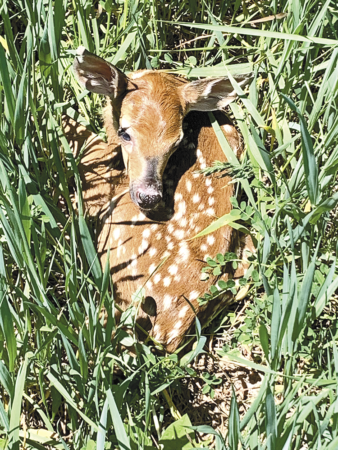Last week I penned an article regarding “The Newborns of Spring,” and just yesterday morning something happened that makes me revisit that topic. Although I had begun an article about something completely different, I feel compelled to share just what happened.
A landowner in northern Lycoming County has for years allowed me permission to hunt spring gobblers on his property. Since the season was nearing its end, I decided to give his woods one more try. Arriving well before daylight, I climbed up into a ladder stand secured against a large pine tree overlooking the edge of a field and waited silently for the sound of the morning’s first gobble. An hour after daybreak the woods were still silent, so I took out a slate call and made a soft and pleading series of hen yelps, but still no gobble was forthcoming.
It was 7:30 a.m. when I first spotted a deer approaching from the woods and moving toward the tall grass at the edge of the field. It was a single doe and as she entered the grassy field, she stood glancing about and then began liking herself at the base of her tail. Since this is the time of year when fawns are being born, I wondered if she was stimulating the beginning of the birthing process. After several minutes and after glancing around – no doubt looking for any nearby predators – she lay down in the tall grass, yet remained visible from my vantage point in the tree stand. And then it happened.
Within a few minutes of lying down, she began giving birth to a fawn! It seemed like the birth took less than a minute or so, and I felt quite privileged to be witnessing the amazing event. First she nuzzled the fawn and then consumed the placenta and began licking the fawn and herself to clean away any scent that was caused through the birthing. Within just a few minutes, the fawn staggered to its feet and then toppled backwards – only to stand again, wobbling back and forth. It was such a unique thrill to be witness to the birth of this newborn fawn. The fawn gained its stability quickly and in a very short time was walking about and climbing on its mother. What a sight!
I have been fortunate to have spent my formative years in the woods and along the streams of Northcentral Pennsylvania and I have seen numerous young fawns in the woods and fields over the years. But with more than 70 years under my belt, this was the first time I have been privileged to witness a birth. I sat in my stand for several hours, until the doe finally got up and moved a short distance from the fawn and stood, diligently scanning for any nearby predator, and then slowly walked away from the fawn that was now curled up in the safety of the tall grass. No doubt she was headed for a long drink of water somewhere nearby. She knew exactly where the fawn was and that it would be safe for awhile. Fawns have no scent when they are first born. It is a way of helping them have a fighting chance against any predators that pass downwind of their hiding spot. Once their scent is developed, they are more susceptible to predation by black bears, coyotes and bobcats.
If a doe spots a nearby predator, she will move away from the fawn in hopes of drawing any attention toward her and away from the location of the young fawn. In its early days, the fawn’s best defense is to lay motionless in its hiding spot, but within an amazingly short time will have developed its ability to outrun some predators.
Once the doe had temporarily left the fawn and was out of sight, I eased down from the tree stand and walked cautiously to within a few feet of the fawn. As it gazed upon its first sighting of a human, I quickly snapped a few photos, then backed away, turned and left the area. No doubt when the doe returned she would pick up my scent and relocate the fawn to another hiding spot nearby.
The amazing things we all have a chance to witness in the world of nature are directly proportional to the time we spend in the woods or along a stream. Perhaps, one of these days, you too might be lucky enough to watch the birth of a fawn!





Leave a Comment
Your email address will not be published. Required fields are marked with *